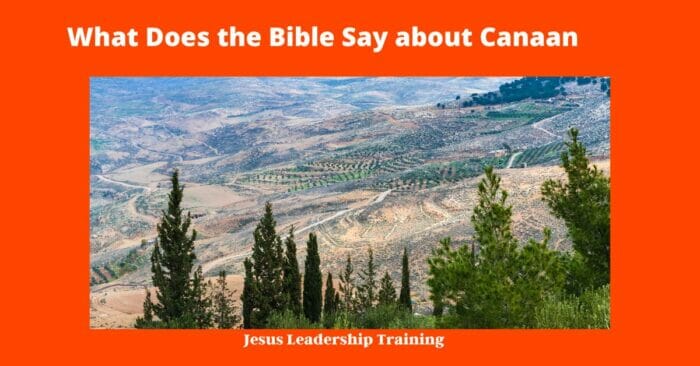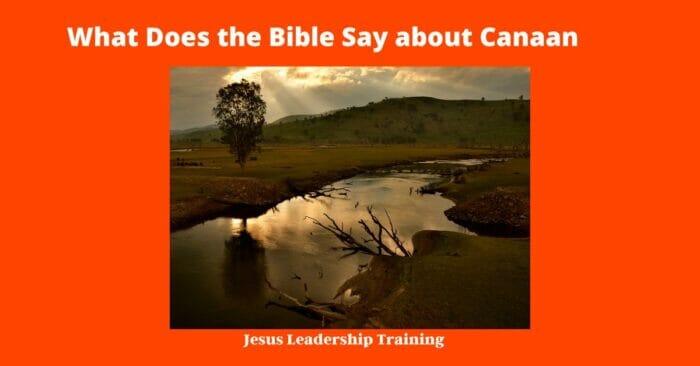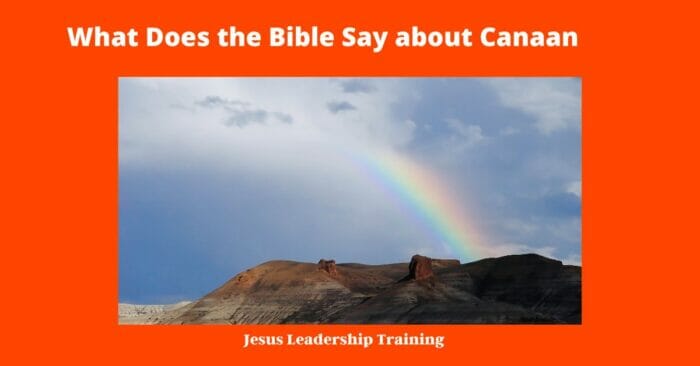What Does the Bible Say about Canaan – The Bible mentions Canaan numerous times throughout its text, with its earliest reference being in the Book of Genesis. The Bible speaks of Canaan as a land given to Abraham and his descendants as a result of God’s promise.
Throughout the Bible, Canaan is depicted as a land of promise and blessing and is often associated with the Promised Land. In the Old Testament, Canaan is primarily associated with the Israelites and their conquest of the land, and it is often used as a metaphor for the spiritual inheritance that comes with faith in God. In the New Testament, Canaan represents the Christian’s spiritual inheritance of the life, death, and resurrection of Jesus Christ. In both cases, Canaan represents a place of hope, blessing, and promise for those who follow God’s will.
Table of Contents
What Does the Bible Say about Canaan
Canaan is an ancient region located in the Middle East and is mentioned numerous times in the Bible. As many as twenty-two different nations were located in the land of Canaan at one time or another. This region is believed to be the birthplace of the nation of Israel, and its significance in the Bible is undeniable.

History of Canaan: A Timeline
The history of Canaan stretches back to the earliest days of recorded history. From the time of Noah and the great flood to the ancient empires of Assyria and Babylon, Canaan has had a long and tumultuous history. It was the land of the Canaanites, a people who are mentioned many times in the Bible.
- ca. 2000 BCE – The Patriarch Abraham enters Canaan and becomes the first of the Hebrew Patriarchs.
- ca. 1700 BCE – The Patriarch Jacob returns to Canaan and later dies there, passing his birthright onto Joseph.
- ca. 1446 BCE – The Exodus begins and the Israelites enter Canaan under the leadership of Moses.
- ca. 1406 BCE – The Israelites begin their conquest of Canaan and defeat the Canaanite city of Jericho.
- ca. 1250 BCE – The Israelites are divided into two kingdoms, Judah and Israel.
- ca. 1000 BCE – King David conquers Jerusalem, uniting the two kingdoms of Judah and Israel.
- ca. 930 BCE – King Solomon builds the Temple in Jerusalem.
- ca. 722 BCE – The Northern Kingdom of Israel is destroyed by the Assyrians.
- ca. 586 BCE – The Babylonians conquer Jerusalem and destroy the Temple.
- ca. 538 BCE – The Babylonian Captivity ends and the Israelites return to Canaan.
- ca. 332 BCE – Alexander the Great conquers the region, ushering in the Hellenistic period.
- ca. 63 BCE – The Roman Empire conquers the region, beginning the Roman period.
- ca. 70 CE – The Romans destroy the Second Temple in Jerusalem.
- ca. 638 CE – The Arab Muslims conquer the region, beginning the Islamic period.
- ca. 1099 CE – The Crusaders conquer the region, beginning the Crusader period.
- ca. 1291 CE – The Mamluks conquer the region, ending the Crusader period.
- ca. 1517 CE – The Ottoman Empire conquers the region, beginning the Ottoman period.
- ca. 1917 CE – The British conquer the region, ending the Ottoman period.
- 1948 CE – The State of Israel is established, marking the modern period of Canaan in the Bible.
God, Israelites,Jews and Canaan in the Bible
The Bible contains numerous references to Canaan and its relationship with God. God commanded the Israelites to conquer the land of Canaan and promised them the land as an everlasting possession. He also gave them a number of special laws and commandments that were to be obeyed while living in Canaan.
- c.1925 BC – Abraham enters Canaan: According to the Bible, Abraham was a nomad from Mesopotamia who was called by God to enter the land of Canaan. He entered with his wife, Sarah, and his nephew, Lot.
- c.1700 BC – Jacob enters Canaan: Jacob was the son of Isaac and the grandson of Abraham. He entered Canaan with his family and eventually settled in the city of Shechem.
- c.1450 BC – The Exodus from Egypt: The Israelites, led by Moses, leave Egypt and enter the Promised Land of Canaan. The journey takes approximately 40 years and is recorded in the Bible.
- c.1250 BC – Joshua conquers Canaan: After the death of Moses, Joshua leads the Israelites in a conquest of Canaan. The Israelites take the cities of Jericho, Ai and other cities and towns.
- c.1050 BC – Saul becomes Israel’s first king: Saul is chosen by the Israelites to be their first king. He leads the Israelites in many battles and defeats the Philistines.
- c.1000 BC – David becomes king of Israel: After Saul’s death, David is chosen to be the king of Israel. He defeats the Philistines and conquers Jerusalem.
- c.931 BC – Solomon becomes king of Israel: Solomon succeeds his father, David, and expands the borders of Israel by annexing Edom, Moab and Syria.
- c.721 BC – Assyrians conquer Israel: The Assyrian Empire conquers the Northern Kingdom of Israel, and the Israelites are sent into exile in Assyria.
- c.538 BC – Babylonians conquer Israel: The Babylonian Empire conquers the Southern Kingdom of Judah, and the Israelites are sent into exile in Babylon.
- c.539 BC – Cyrus conquers Babylon: Cyrus, king of Persia, conquers Babylon and allows the Israelites to return to the Promised Land.

Who Were the Canaanites?
The Canaanites were ancient Semitic people who lived in the land of Canaan. They were polytheistic and worshipped many gods, including the goddess Asherah. They were also noted for their skill in metalworking and for their trade in olive oil and wine.
An Overview of Canaan’s Geography
Canaan was located in what is now the Middle East, bordered by the Mediterranean Sea to the west and the deserts of the Arabian Peninsula to the east. It was also close to the ancient cities of Babylon and Nineveh. Its climate ranged from semi-arid to Mediterranean, with hot, dry summers and mild winters.
Climatic Conditions of Canaan
The climate of Canaan was hot and dry for much of the year, with temperatures often reaching over 100 degrees Fahrenheit. Rainfall was sporadic, with some years receiving no rain at all. This made it difficult for the people of Canaan to grow crops and sustain themselves.
Political Impact of Canaan in the Bible
Canaan was an important region in the Bible, both politically and spiritually. It was the land promised to the Israelites by God and was the site of many battles and wars throughout the Bible. The political importance of Canaan is evident in the numerous references to it throughout the Bible.

Religions of the Canaanites
The Canaanites were polytheists, believing in multiple gods and goddesses. They worshipped many gods, including El, the father of the gods, and Baal, the god of storms. They also worshipped the goddess Asherah, who was the goddess of fertility and love.
- Judaism (14th century BCE): Judaism is the oldest of the monotheistic religions in Canaan, with its roots found in the books of the Hebrew Bible. It is based on the belief in one God and the laws of Moses as contained in the Torah.
- Canaanite Religion (14th century BCE): This religion was based on the worship of many gods, including El and Baal. This religion was widespread in the region of Canaan before the arrival of the Hebrews.
- Christianity (1st century CE): Christianity was first introduced to the region by the followers of Jesus of Nazareth. It is based on the teachings of Jesus and the belief in the resurrection and salvation.
- Islam (7th century CE): Islam was founded by the prophet Muhammad and is based on the teachings found in the Qur’an. It is one of the fastest-growing religions in the world today and is practiced by over a billion people.
- Druze (11th century CE): The Druze are a religion based on Islamic, Christian and Jewish beliefs. They believe in reincarnation, a spiritual hierarchy and the unity of God.
- Bahai Faith (19th century CE): The Bahai Faith is a relatively new religion based on the teachings of its founder Baha’u’llah. It promotes the unity of all religions and the establishment of world peace.

Bible Verses about Canaan
The Bible contains numerous references to the land of Canaan. These verses provide valuable insight into the relationship between God and the people of Canaan. Examples include: “Go up to the land of Canaan, for I have given it to you for a possession” (Genesis 12:7); “The Lord your God will bless you in all the work of your hands, in the land of Canaan” (Deuteronomy 15:18).
The Promised Land of Canaan
Canaan was the promised land that God promised to the Israelites. It was a land of milk and honey, and it was a place where the Israelites could live in peace and prosperity. It was also the place where the Israelites experienced many of their greatest victories, such as their conquest of Jericho.
Israel and Canaan in the World News
The ongoing conflict between Israel and the Palestinian people has been a major topic in the news for many years. This conflict is rooted in the ancient land of Canaan and the competing claims of each group to the land. The recent violence in the region has drawn attention to the importance of understanding the history of Canaan in order to better understand the conflict.
Pictures of the Land of Canaan
Canaan is an ancient land with a rich history and culture. Pictures of the land of Canaan capture its beauty and its significance to the people of the region. From the rolling hills of the Galilee to the vibrant cities of Jerusalem and Tel Aviv, pictures of the land of Canaan are a reminder of its importance in the Bible.
Stories of Canaan in the Bible
The Bible contains numerous stories about the people of Canaan. From the story of Abraham and Sarah to the fall of Jericho, these stories are full of lessons about faith, courage, and the importance of obeying God. They also provide valuable insight into the history and culture of the people of Canaan.
What Does the Bible Say about Canaan?
The Bible contains numerous references to the land of Canaan and its people. It speaks of God’s promise to the Israelites to give them the land as their promised possession. It also speaks of the need for the Israelites to obey God’s commandments while living in the land of Canaan.
The Significance of Canaan in World History
Canaan has been an important region in world history for thousands of years. It was the birthplace of the nation of Israel, and its significance in the Bible is undeniable. It has also been the site of many wars and conflicts, making it an important region in the study of world history.
How Canaan Changed Over Time
The land of Canaan has gone through many changes over the centuries. It was once a powerful region, with great cities and a thriving economy. But it has also been conquered and occupied by various foreign powers, leaving its people to struggle for independence.
Canaan and its Impact on World Politics
The land of Canaan has been a major factor in world politics for centuries. It has been the site of countless wars and conflicts, and its importance in the Middle East is undeniable. The ongoing conflict between Israel and the Palestinians is rooted in their competing claims to the land of Canaan.
Final Thoughts – What Does the Bible Say about Canaan
Canaan is an ancient region that has played a significant role in world history. It was the land promised to the Israelites by God, and it was the birthplace of the nation of Israel. It has also been the site of many wars and conflicts, and its significance in world politics is undeniable. The Bible contains numerous references to the land of Canaan and its importance to God and the Israelites. Its history and impact on the world are undeniable, and it is an important part of the study of world history.




